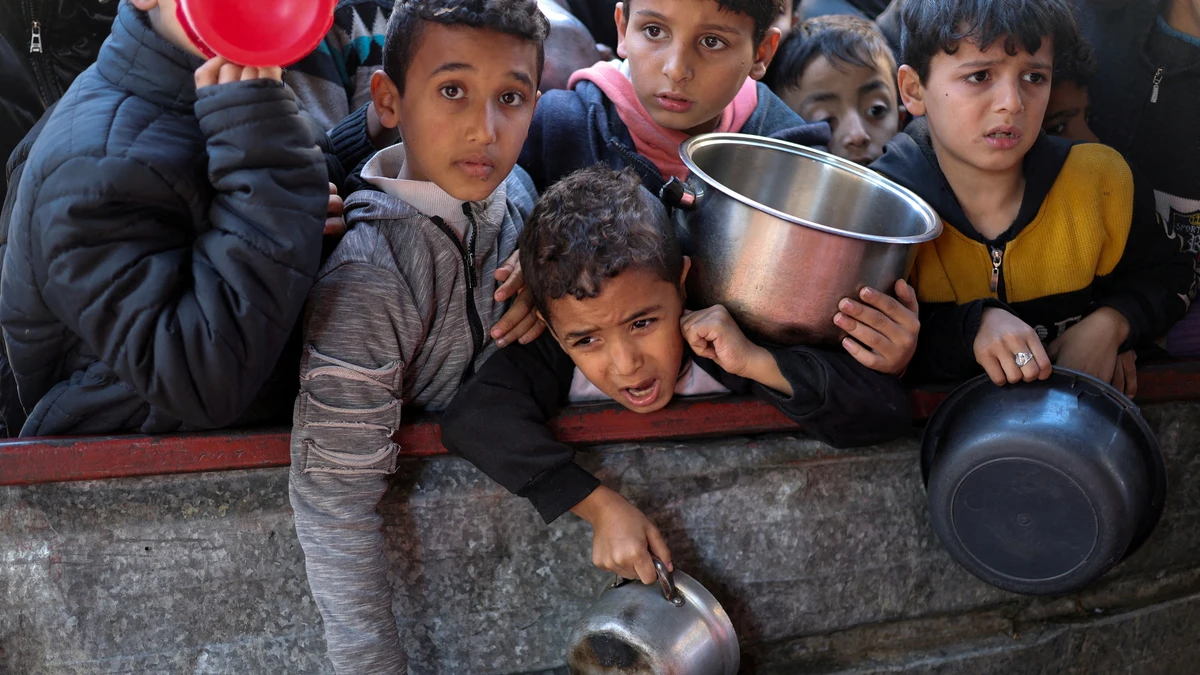
While waiting for a ceasefire that does not come, in Gaza there is desperate insecurity and imminent famine in the enclave, after the death of 15 children from dehydration and malnutrition. Something that aid launched through the air cannot alleviate because it is insufficient. Meanwhile, this Sunday truce negotiations have resumed in Cairo between delegations from Hamas, the United States, Egypt and Qatar, but without Israel.
A situation that distances objective expressed by the mediators: a pact before the Muslim holy month of Ramadan. In fact, Israel will not send a negotiating delegation to Cairo this Sunday due to the refusal of the Islamist group Hamas to share its list of live hostages, according to official sources cited by Israeli media.
The Israeli government had already warned that, if it did not receive more information about the state of health of the captives, would not continue negotiating a ceasefire with the Islamist organization in the Gaza Strip.
Hamas, for its part, insists that a temporary truce be accompanied by an agreement for a cessation of hostilities in a second phase, which Israel opposes, determined to continue its land offensive in Rafah, a town at the southern end of the Strip and on the border with Egypt where more than 1.4 million displaced people are crowded.
help by air
Meanwhile, the Gazans receive food that arrives by air launched by the US: it is their first air launch of humanitarian aid to the enclave, but NGOs see it as insufficient. There are about 38,000 portions of food in boxes: They are combat rationsthe same ones used by American soldiers because they are very caloric, nutritious and very easy to prepare. Although some of the packages need water.
The Central Command of the US Army, CENTCOM, has confirmed this joint operation with the Royal Jordanian Air Force, and that it took place between 3:00 p.m. and 5:00 p.m. (Gaza time, 2:00 p.m. and 4:00 p.m. in Spain) to “provide essential aid to civilians affected by the conflict“.
Thus begins the operation authorized this week by the President of the United States, Joe Biden, to try to alleviate the devastating humanitarian crisis in Gaza due to the Israeli military operation. In the last daysFrance, Egypt or Jordan They have launched several aid deliveries through this same system given the enormous difficulty in the entry of humanitarian aid by land due to the fighting and the Israeli blockades on the passes to the enclave.
However, this type of help has been viewed with considerable skepticism by both international NGOs as well as by prominent diplomatic representatives such as the high representative of the EU Josep Borrell, understanding that it is little less than a testimonial effort which also endangers the safety of desperate Palestinians trying to reach the packages.
Children die of hunger
José María Vera, executive director of Unicef Spain, explains to laSexta Noticias that “it’s okay, but it’s still not effective” because “drinking water is one of the scarce resources in the Strip.” The blockade and restrictions on the entry of humanitarian aid in northern Gaza are costing lives, as explained by Vera, who assures that “the “child deaths we feared are here”. “Malnutrition wreaks havoc in the Strip”
In fact, there are already 15 Gazan children who have died due to dehydration and malnutrition. ““These tragic and horrible deaths are man-made, predictable and totally avoidable.”, denounces the director of Unicef Spain. The same head of the Israeli National Food Security Council has called for a ceasefire in Gaza due to this terrible humanitarian situation.
The deaths of children from malnutrition, in fact, no longer surprise health and humanitarian personnel. “We feared that there would be deaths of children here because malnutrition ravages the Gaza Strip,” said UNICEF regional director for the Middle East and North Africa, Adele Khodr. “There are probably more children fighting for their lives in the few remaining hospitals in Gaza,” has warned, while denouncing that these “tragic and horrific deaths are the work of human beings, predictable and entirely avoidable.”
“The widespread lack of nutritious food, safe water and sanitation services is a direct consequence of impediments to access and multiple dangers facing UN humanitarian operations and affect minors and mothers, their ability to breastfeed their babies, particularly in the Gaza Strip. People are hungry, exhausted and traumatized,” he explained. Humanitarian organizations have warned of the possible consequences since October and if measures are not taken and the war ends “the deaths of children will increase rapidly.”
More than 30,000 dead
The latest Israeli attack in eastern Rafah has ended with the lives of 14 people, including six children. Meanwhile, the authorities of the Gaza Strip have raised this Sunday to 30,410 Palestinians killed in the offensive military launched by Israel against the enclave after the attacks carried out on October 7 by the Islamist group.
Source: Lasexta
Ricardo is a renowned author and journalist, known for his exceptional writing on top-news stories. He currently works as a writer at the 247 News Agency, where he is known for his ability to deliver breaking news and insightful analysis on the most pressing issues of the day.












